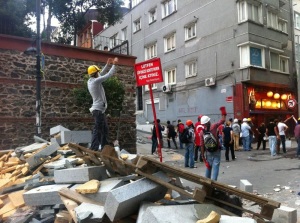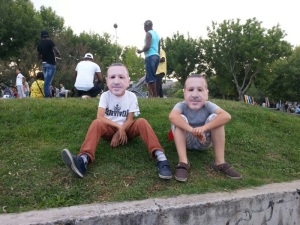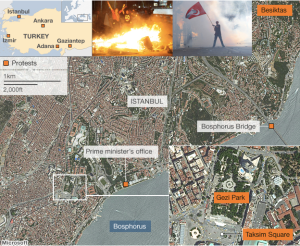Its difficult not to take sides on what’s going on in Turkey. For me, it’s not about picking the sides of protestors or politics. It’s about solutions, and for that to happen you don’t have to be aligned with one side or another. But you do have to listen to and understand both. I have plenty of friends who have taken part in the demonstrations in Ankara and Istanbul (including two media friends who were assaulted by police) and equally know those within the government as well as their supporters. Yet, I won’t take sides because for me, the most important area is the grey one. The grey area is the space between right and wrong, between yes and no which is going to lead to a solution. Picking sides merely prolongs the status quo, it also unnecessarily personalises the issue. Are you democrat or authoritarian? Are you Islamist or secularist?.. and so on. These are moot points which simply divides. This is why on Saturday (22 June), when protestors went with their carnations to Taksim, only again to be dispersed by water cannons and tear gas, I asked what is the objective of the protestors now, and why, if police want to end the confrontations, do they not just cordon off the square in the name of limiting disruption to public order? Rather than letting emotion prevail, lets look for some reason and rationality to move beyond sentiment and towards some tangible solutions.
In the meantime I collect information from people on the ground, monitor foreign press particularly and the narratives they give and offer my two cents especially because there is much misunderstanding and misinformation. One would be forgiven for thinking that protests encompassed all over Turkey, that it was too dangerous to travel there and that 70% of cancelled reservations and empty hotel rooms verified the seriousness of the situation. What was missing from much reporting was context. The protests in Istanbul and Ankara – the two largest cities with ongoing demonstrations, and the ones I am very familiar with were limited to just a number of streets. What was also absent on social media feeds during were counts: how many people were in the streets, versus, for instance the protests in Brazil where numbers have more reliably accompanied reporting. See Gabriel Elizondo for more. By broadcasting images showing crowds and clashes, without quantifying the situation it is very easy to think this was the general Turkish landscape. Turkey’s population is 76 million and Istanbul’s roads number 25,000km worth. The protests took place in under a 10km Istanbul radius. The BBC had a nice little map showing just limited the space was in the context of a city of 17 million people and yet I still receive regular messages and concerns of whether what is happening is throughout Turkey in its entirety. My primary news source since the second week of protests, has been Twitter – either media folks who are reliable, and my own contacts. Facebook is Turkey’s primary social media platform. Much organisation, action, and testimony has been collated there. When I see or read something, I can verify it quickly by getting in touch with whoever posted it, asking them where it came from and then for the original image. Reputation and reliability is not difficult to build (which is also why personal contacts and connections with communities is the at the heart of any citizen journalism efforts).

Barricades in one of Istanbul’s well to do areas. Image via @FatmaKilicaslan
Still, it does get personal. When I see the streets I walked every day to and from work with barricades put up, when I see the windows and shutters of my neighbourhood grocer, bank, the cart of the simit (bread ring) seller smashed and graffitied, when the store owners I know are not able to open their doors or suffer while working because of the tear gas, when I see clouds of tear gas on the street I lived on, of course it gets personal. But blaming one side or the other without proposing a solution or understanding all sides won’t get you anywhere.
Where to start? The first thing for those outside of Turkey or not familiar with the context is to pay attention to how things are being reported: take away the emotive language, look for verified numbers, and also look at what both sides are saying. Then make your assessment.
1. What does emotive language look like?
Its anything that can’t be measured, for instance: massive, oppressive, accused, could do this or that. These should all be red flags.
2. Look for verified numbers
Go for reliable sources and even better see if a second source says the same thing. For instance “economic fallout” doesn’t tell you much but “a drop of 17% according to the tourism and hotels union” (with a date attached is even better). Anything else is just sloppy journalism and remember reporting is a process, there are editors, producers and entire chains of command until an article or report reaches the viewer. One Turkish newspaper didn’t stop to double-check whether a major political figure had actually died before sending a Twitter update out and if major media continue to make basic spelling and grammar mistakes, you should already be on the back foot when consuming news.
3. Look at both sides

Image via @BusraAkin
It’s very easy to take sides on whats happening and dismiss the other. Both sides have considerable numbers, both sides can paint the other as irrational, irrelevant and the one to be overcome. Now there are some government representatives who have been explaining what has been happening in layman’s terms. Foreign Minister Ahmet Davutoglu and advisor to the Prime Minister Ibrahim Kalin are two. They contextualise events and compare to similar circumstances elsewhere. This gives perspective. Other government rhetoric, rather than grandstanding and accusing needs to acknowledge and keep things simple. Most of the world does not know about Turkey’s political, social or economic history. They only see the here and now. Making an issue accessible doesn’t just inform, it also brings understanding.

Image via @emresano
Blaming and restatement of grievances will win you support within your own circles, but won’t bring solutions nor will move democracy forward. Remember, democracy is not a static concept, it’s a continual work in progress and for it to work, it needs participation – by voting, or protesting, or being informed and being discerning. Its only by exploring that grey area with clear objectives and rational dialogue that progress stands any chance.





